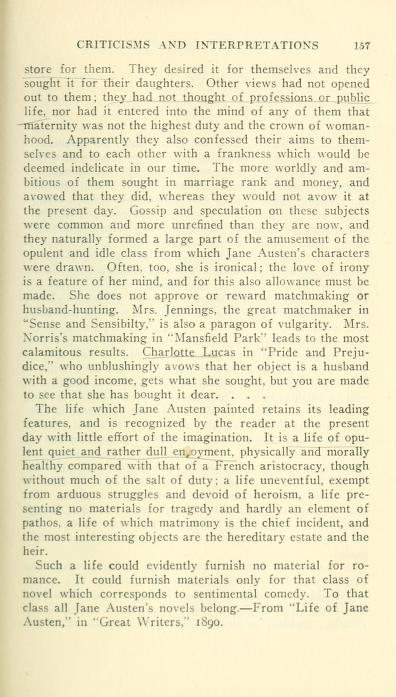 ............prev...................v?....................next
............prev...................v?....................next {{prhprp157.jpg}}
store for them. They desired it for themselves and they
sought it for their daughters. Other views had not opened
out to them; they had not thought of professions or public
life, nor had it entered into the mind of any of them that
maternity was not the highest duty and the crown of woman-
hood. Apparently they also confessed their aims to them-
selves and to each other with a frankness which would be
deemed indelicate in our time. The more worldly and am-
bitious of them sought in marriage rank and money, and
avowed that they did, whereas they would not avow it at
the present day. Gossip and speculation on these subjects
were common and more unrefined than they are now, and
they naturally formed a large part of the amusement of the
opulent and idle class from which Jane Austen's characters
were drawn. Often, too, she is ironical; the love of irony
is a feature of her mind, and for this also allowance must be
made. She does not approve or reward matchmaking or
husband-hunting. Mrs. Jennings, the great matchmaker in
"Sense and Sensibility," is also a paragon of vulgarity. Mrs.
Norris's matchmaking in "Mansfield Park" leads to the most
calamitous results. Charlotte Lucas in "Pride and Preju-
dice," who unblushingly avows that her object is a husband
with a good income, gets what she sought, but you are made
to see that she has bought it dear...
The life which Jane Austen painted retains its leading
features, and is recognized by the reader at the present
day with little effort of the imagination. It is a life of opu-
lent quiet and rather dull enjoyment, physically and morally
healthy compared with that of a French aristocracy, though
without much of the salt of duty; a life uneventful, exempt
from arduous struggles and devoid of heroism, a life pre-
senting no materials for tragedy and hardly an element of
pathos, a life of which matrimony is the chief incident, and
the most interesting objects are the hereditary estate and the
heir.
Such a life could evidently furnish no material for ro-
mance. It could furnish materials only for that class of
novel which corresponds to sentimental comedy. To that
class all Jane Austen's novels belong. -- From "Life of Jane
Austen," in "Great Writers," 1890.
[157]............prev.....................next................